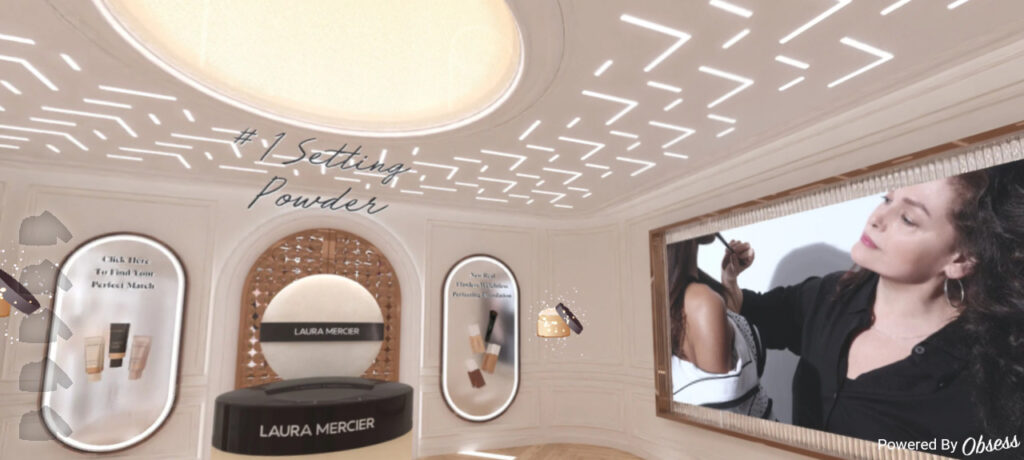Countless obituaries have been written about the metaverse, but not everyone is reading from the same page. This week, 120-year old American cosmetics brand Elizabeth Arden launched its first virtual store in the metaverse. The store’s opening signals the growing importance of the metaverse for the beauty industry throughout the world.
Located on the experiential e-commerce platform Obsess, the digital store allows users to explore Elizabeth Arden’s products like skincare and fragrances, and learn about its history. It is a fully immersive experience that lets people interact with the products in a realistic way.
According to Martine Williamson, the brand’s global chief marketing officer, users can zoom in on the products, read about their ingredients, and even try them on virtually. The store also features a history section that tells the story of the eponymous brand founder.
“We are truly operating as an omnichannel business to evolve our customer experience and engage a whole new generation of shoppers about our products and legacy through digital storytelling,” Williamson said in a statement.
Also read: Gucci uses Metaverse as a Product Testing Ground
Reinventing beauty the metaverse way
The metaverse is an emerging, immersive virtual world created by the convergence of virtual reality (VR), augmented reality (AR), and the internet. It is a place where people can connect with each other and with digital content in a way that feels real for some users.
In an industry that already thrives on digital marketing and e-commerce, beauty brands are well-positioned to benefit from the metaverse. It can offer brands such as Elizabeth Arden a new way to reach consumers, according to metaverse expert and author Rume Dominic.
“The metaverse is an opportunity [for entities] to innovate on a more immersive experience [for consumers] in the application of their beauty products virtually,” Dominic, author of beginners guide “An Evolution into the Metaverse,” told MetaNews.
“It also promotes a better social community – online is the new community. Like it or not, there is influence and value distribution of environments that the metaverse allows you to experience. Elizabeth Arden wants to meet its customers at their point of need,” he added.
As a leading beauty industry innovator for over 120 years, we are thrilled to introduce to you the first-ever virtual store experience for Elizabeth Arden! 🎉
We can't wait to see you all there!
Tap to explore our new virtual world: https://t.co/0ByzvEBtFg pic.twitter.com/HGtgD3DCQ2
— Elizabeth Arden (@ElizabethArden) May 16, 2023
Dominic spoke about how Elizabeth Arden could use the metaverse to create virtual makeovers or to offer live beauty tutorials. The metaverse is also useful for building new forms of beauty content, including virtual fashion shows and beauty documentaries.
“This is a journey into the digital transformation of their [beauty companies] e-commerce and online shopping by balancing virtual and physical experiences,” said Dominic.
More beauty brands join the bandwagon
Beauty lovers are already experiencing multiple metaverse use cases elsewhere in the industry. Brands that include Sephora, MAC Cosmetics, and L’Oréal have all opened stores in the metaverse.
These brands are using the metaverse to engage directly with their customers for commercial and promotional purposes.
In April, Estee Lauder’s Clinique launched its eponymous virtual shopping experience called “Clinique Lab”. The digital storefront, built in partnership with metaverse company Journee, comes with a virtual Clinique counter that lets users create a customized avatar and explore six unique zones.

French beauty brand Laura Mercier opened its World of Beauty metaverse store in December. As with Elizabeth Arden, the company worked with Obsess to set up its first virtually experiential e-commerce presence. Laura Mercier is making use of web-based VR and AR to offer high-definition quality, 3D and 360-degree metaverse experiences.
Obsess recently launched its Ava by Obsess service, which enables brands and retailers to create stores in the metaverse. To date, the company says it’s helped create over 200 immersive stores for brands like Ralph Lauren and Charlotte Tilbury.
For Charlotte Tilbury, the retailer initially launched a digital twin of its physical store in 2020. The following year the company unveiled a 3D virtual store with a feature enabling users to invite their friends and family to join them for a virtual store experience by email or text.
The retailer reportedly “now offers metaverse shoppers branded avatars that can be personalized across all of a shopper’s characteristics, including skin tone, facial features, body shape, clothing and makeup.”
Not all rosy
But it is not always rosy for beauty brands pitching up to the metaverse. Metaverse expert Rume Dominic told MetaNews that companies could struggle with issues of data privacy and security, including the requisite technology and infrastructure.
“The technology may not be as reliable as it needs to be and the cost of setting up and and maintaining a metaverse store is expensive,” he said.
There are also issues around lack of regulation in the space, which means “there are no clear rules or regulations about how businesses can operate in the metaverse.”









 and then
and then